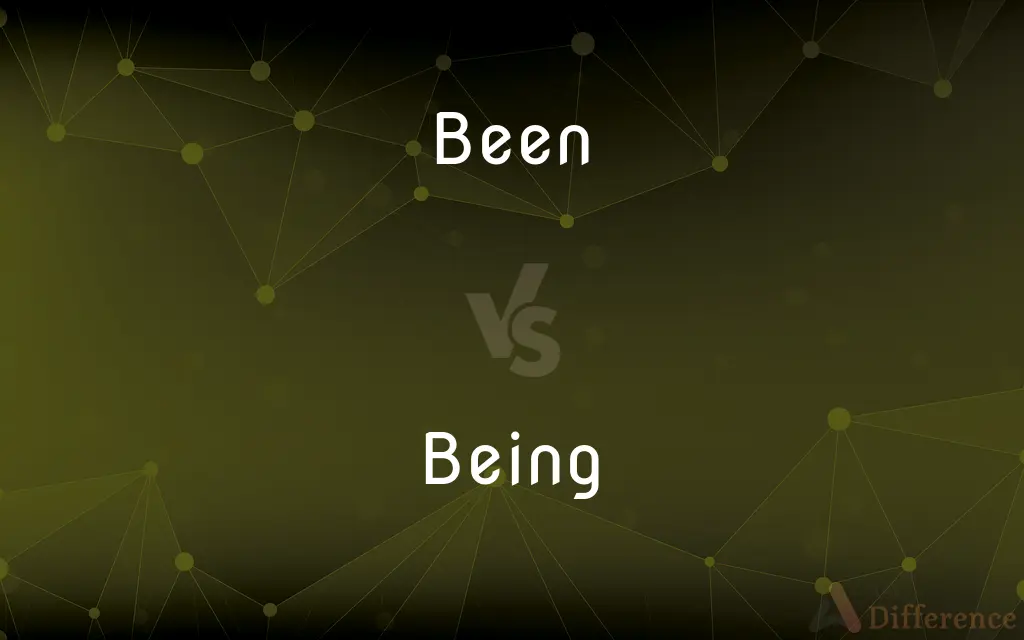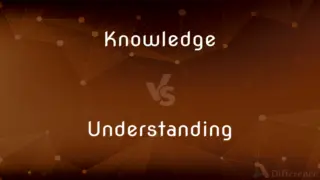Been vs. Being — What's the Difference?
By Tayyaba Rehman — Updated on October 30, 2023
"Been" is the past participle of "be," used in perfect tense constructions, while "being" is the present participle of "be," and also serves as a noun that refers to existence.

Difference Between Been and Being
Table of Contents
ADVERTISEMENT
Key Differences
Been is the past participle form of the verb “to be.” It is used in perfect tense constructions to indicate an action or state that began in the past and may continue into the present. For example, “I have been to Paris” implies a past visit to Paris.
Being, in contrast, is the present participle form of the verb “to be.” It is used in continuous tense constructions to denote ongoing actions or states. For instance, “I am being careful” indicates a current state of carefulness.
In grammar, been is essential in forming present perfect, past perfect, and future perfect tenses. It often pairs with auxiliary verbs like “have” or “had” to form these tenses. “They had been waiting for hours” is an example of the past perfect tense.
Being also serves as a noun, referring to the state of existing. It can denote a living creature or entity. For example, “a human being.” When used as a verb, it expresses an action that is happening currently, as in “She is being honest.”
The usage of been implies completion or continuation of an action or state from the past, often relating to experience or change. “She has been a teacher for ten years” suggests a continuing career in teaching.
ADVERTISEMENT
The use of being, particularly as a noun, delves into philosophical or existential concepts. As a verb, it stresses the current process or state, emphasizing the present. “He is being treated for his injury” focuses on the ongoing treatment.
Comparison Chart
Grammatical Role
Past participle
Present participle or noun
Tense Usage
Used in perfect tenses
Used in continuous tenses
Time Frame
Indicates past or completed actions
Indicates ongoing or current actions
Examples
"I have been there."
"I am being careful."
Additional Meaning
None
As a noun, refers to existence
Compare with Definitions
Been
Past participle of "be"
She has been to Rome.
Being
Present participle of "be"
She is being careful.
Been
Used in perfect tenses
They had been friends for years.
Being
Used in continuous tenses
He was being followed.
Been
Indicates past action
I have been working here since 2010.
Being
Denotes current state
They are being interviewed.
Been
Suggests continuation
We have been living here for a decade.
Being
Noun for existence
A human being.
Been
Past participle of be.
Being
In philosophy, being is the material or immaterial existence of a thing. Anything that exists is being.
Been
Inflection of be.
All the fries have been eaten.
Being
Existence
The railway brought many towns into being
The single market came into being in 1993
Been
Inflection of be.
He been had that job.
We been knew they was doing this.
Being
The nature or essence of a person
Sometimes one aspect of our being has been developed at the expense of the others
Been
Synonym of be.
It useta been five foot long.
Being
A real or imaginary living creature or entity, especially an intelligent one
A rational being
Alien beings
Been
(obsolete) be.
Being
The state or quality of having existence
Technical advances that have only recently come into being.
Been
The past participle of Be. In old authors it is also the pr. tense plural of Be. See 1st Bee.
Assembled been a senate grave and stout.
Being
The totality of all things that exist
Theologians who hold that the mind of God is the source of all being.
Been
Implies experience or change
He has been a great help.
Being
A person
"The artist after all is a solitary being" (Virginia Woolf).
Being
An individual form of life; an organism
"We [humans] are the only beings who are aware that we shall die" (Seyyed Hossein Nasr).
Being
An imaginary, conjectural, or supernatural creature
Extraterrestrial beings.
Being
All the qualities constituting one that exists; the essence
The very being of human nature.
Being
One's basic or essential nature
"[My grandfather's] face, words and gestures are a permanent part of my being" (Duane Nitatum).
Being
Because; since. Often used with as or that.
Being
Present participle of be
Being
A living creature.
Being
The state or fact of existence, consciousness, or life, or something in such a state.
Being
(philosophy) That which has actuality (materially or in concept).
Being
(philosophy) One's basic nature, or the qualities thereof; essence or personality.
Being
(obsolete) An abode; a cottage.
Being
Given that; since.
Being
Existing.
A man who is being strangled.
While the article on Burns was being written.
Fresh experience is always being gained.
Being
Existence, as opposed to nonexistence; state or sphere of existence.
In Him we live, and move, and have our being.
Being
That which exists in any form, whether it be material or spiritual, actual or ideal; living existence, as distinguished from a thing without life; as, a human being; spiritual beings.
What a sweet being is an honest mind !
A Being of infinite benevolence and power.
Being
Lifetime; mortal existence.
Claudius, thouWast follower of his fortunes in his being.
Being
An abode; a cottage.
It was a relief to dismiss them [Sir Roger's servants] into little beings within my manor.
Being
Since; inasmuch as.
And being you haveDeclined his means, you have increased his malice.
Being
The state or fact of existing;
A point of view gradually coming into being
Laws in existence for centuries
Being
A living thing that has (or can develop) the ability to act or function independently
Being
Philosophical concept
The essence of being.
Common Curiosities
Is "been" used for current actions?
No, "been" relates to past or completed actions.
Does "being" as a verb always imply present action?
Yes, "being" as a verb denotes current or ongoing actions.
Can "been" indicate a state?
Yes, it can indicate a past state, as in "I've been tired."
Is "been" always paired with "have" or "had"?
Yes, "been" is typically used with "have," "has," or "had."
Is "being" used in perfect tenses?
No, "being" is not used in perfect tenses.
Does "been" have a philosophical use?
No, "been" is strictly used as a past participle.
Is "been" ever used in present tense?
No, "been" is not used in the present tense.
Can "being" be a standalone noun?
Yes, "being" can be a noun referring to existence or a living entity.
Can "being" denote a creature?
Yes, as a noun, it can refer to a creature or entity.
Can "been" stand alone in a sentence?
Typically, no. It's used with auxiliary verbs.
Does "being" always indicate action?
As a verb, yes; as a noun, it refers to existence.
Can "being" be used in past tense?
Yes, as in "He was being careful."
Does "been" imply future actions?
No, it relates to past or completed actions.
Are "been" and "being" interchangeable?
No, they serve different grammatical purposes.
Can "being" be used to describe a person's nature?
Yes, especially when used as a noun.
Share Your Discovery

Previous Comparison
Knowledge vs. Understanding
Next Comparison
Jute vs. HessianAuthor Spotlight
Written by
Tayyaba RehmanTayyaba Rehman is a distinguished writer, currently serving as a primary contributor to askdifference.com. As a researcher in semantics and etymology, Tayyaba's passion for the complexity of languages and their distinctions has found a perfect home on the platform. Tayyaba delves into the intricacies of language, distinguishing between commonly confused words and phrases, thereby providing clarity for readers worldwide.














































